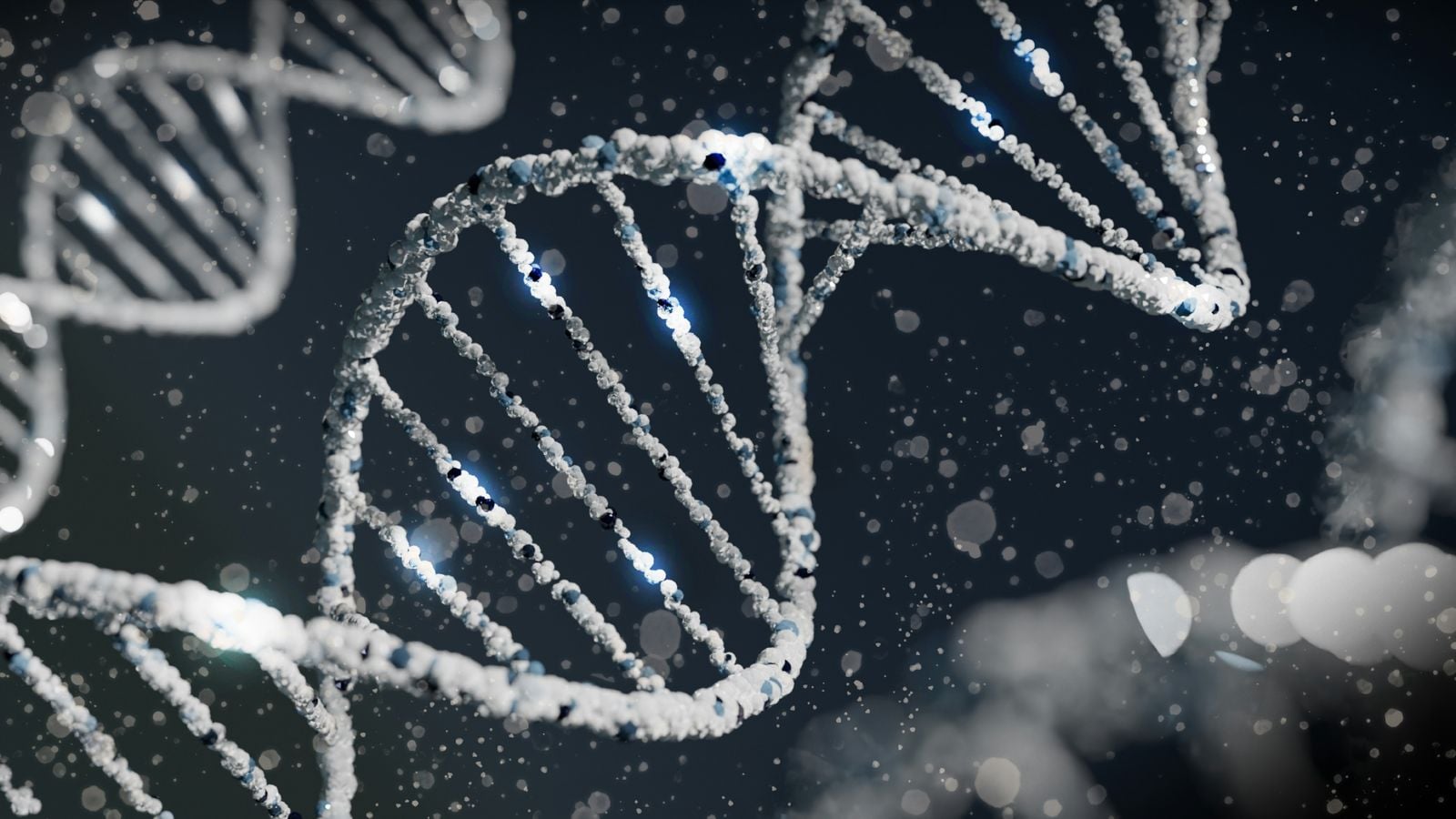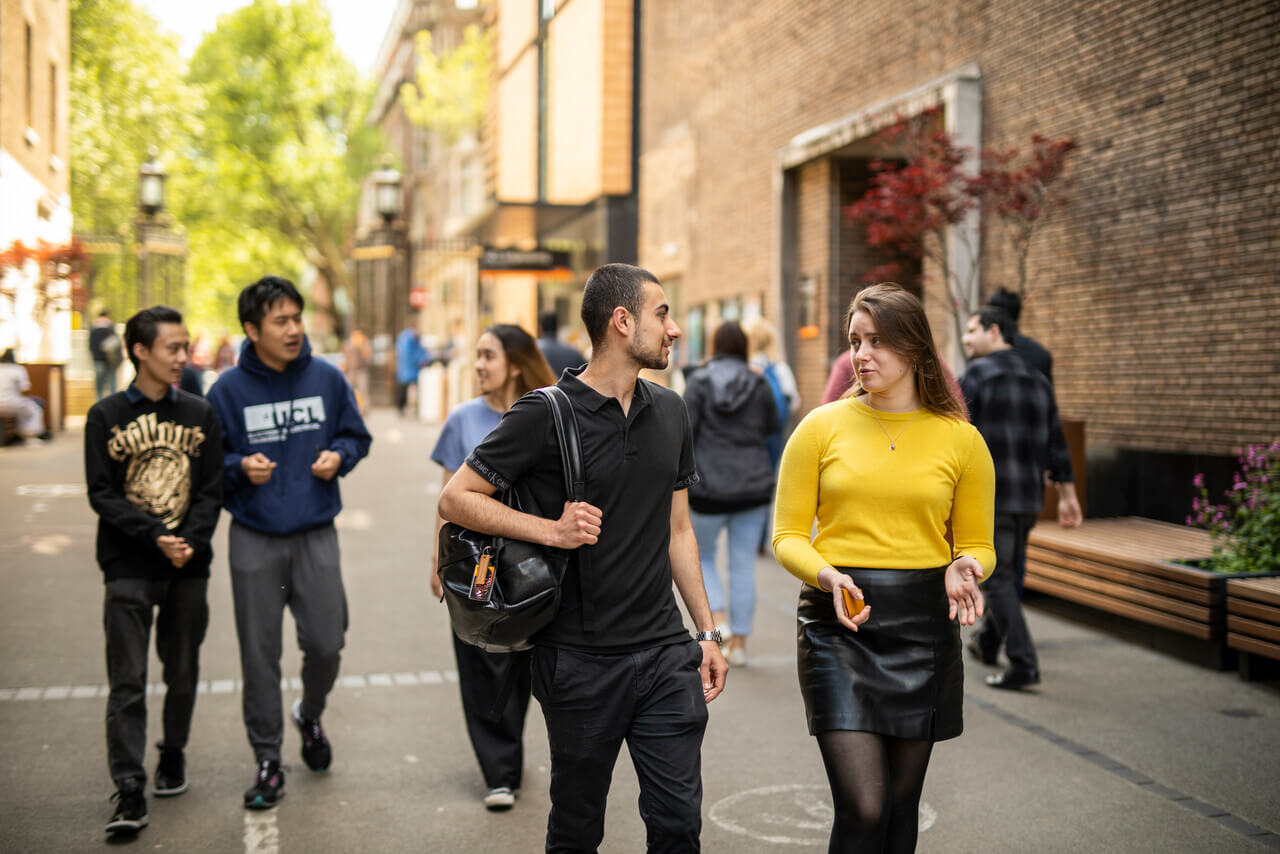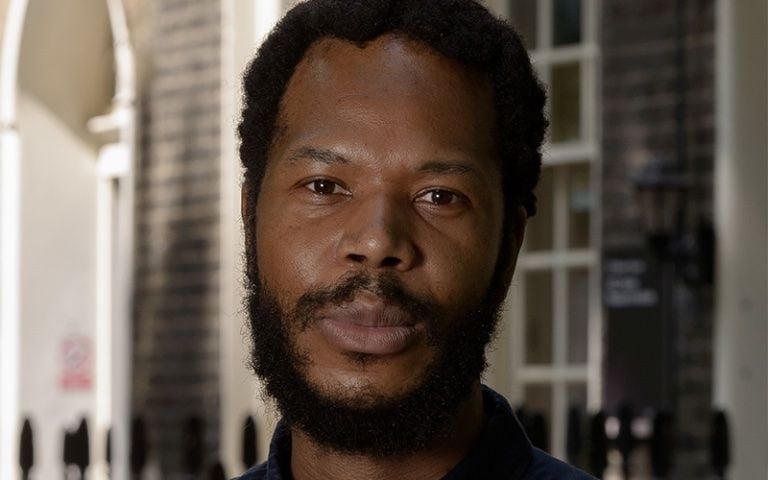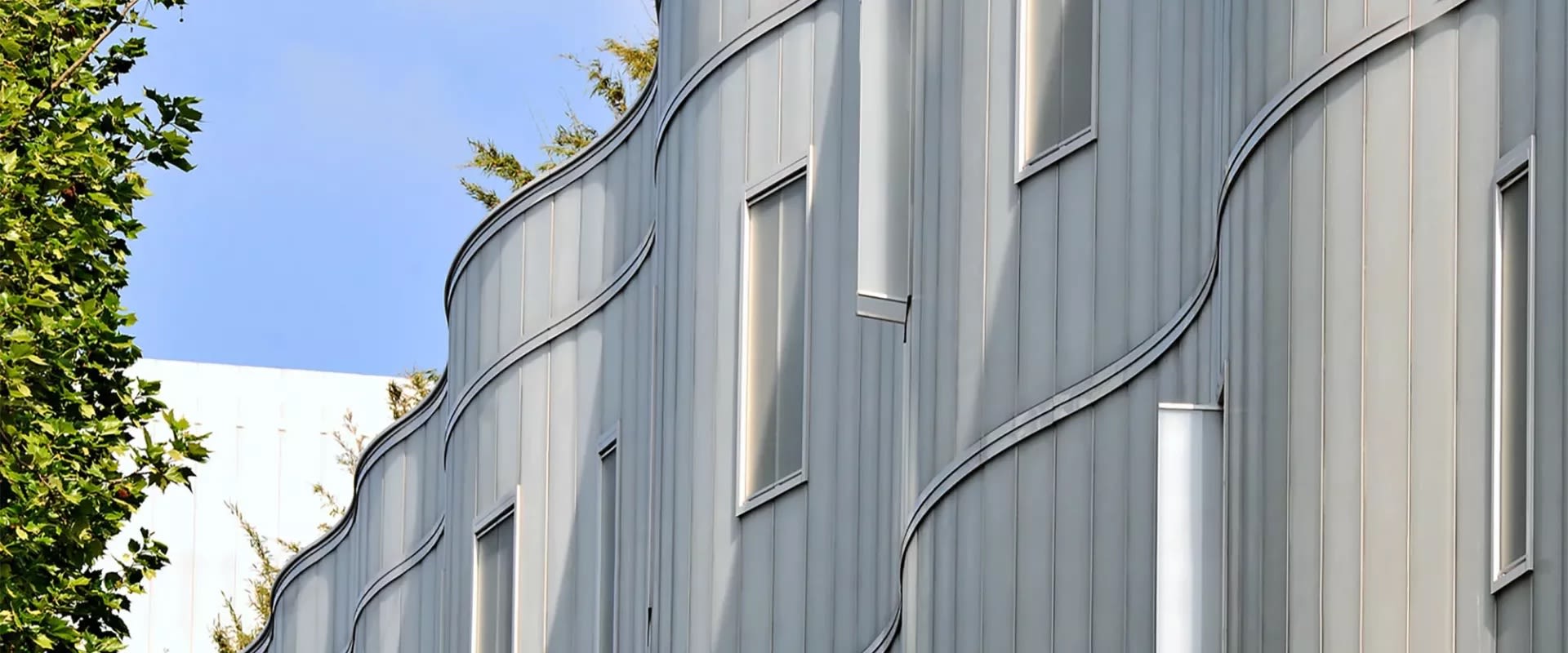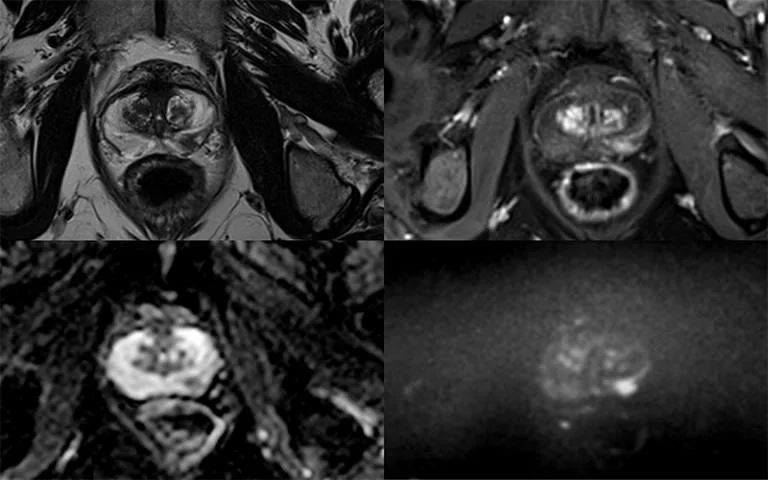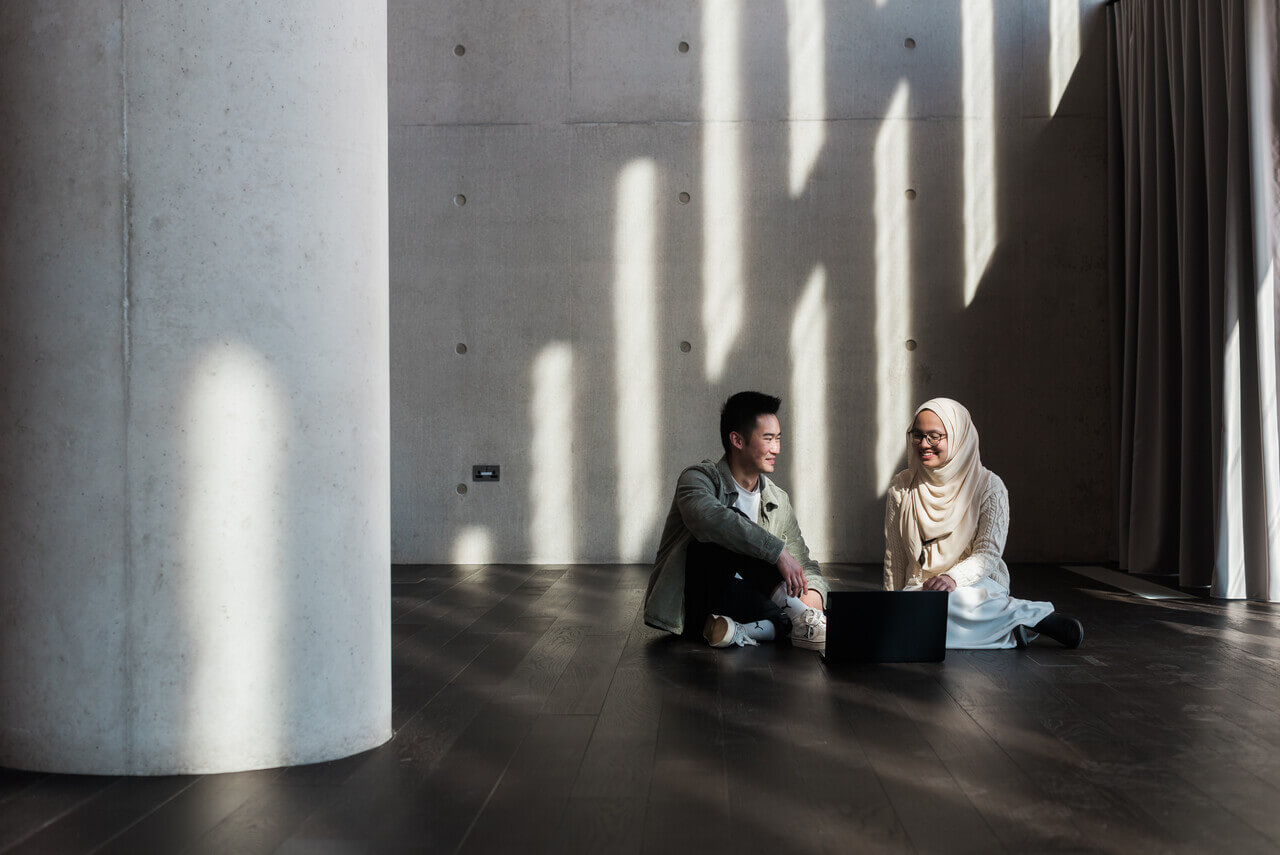
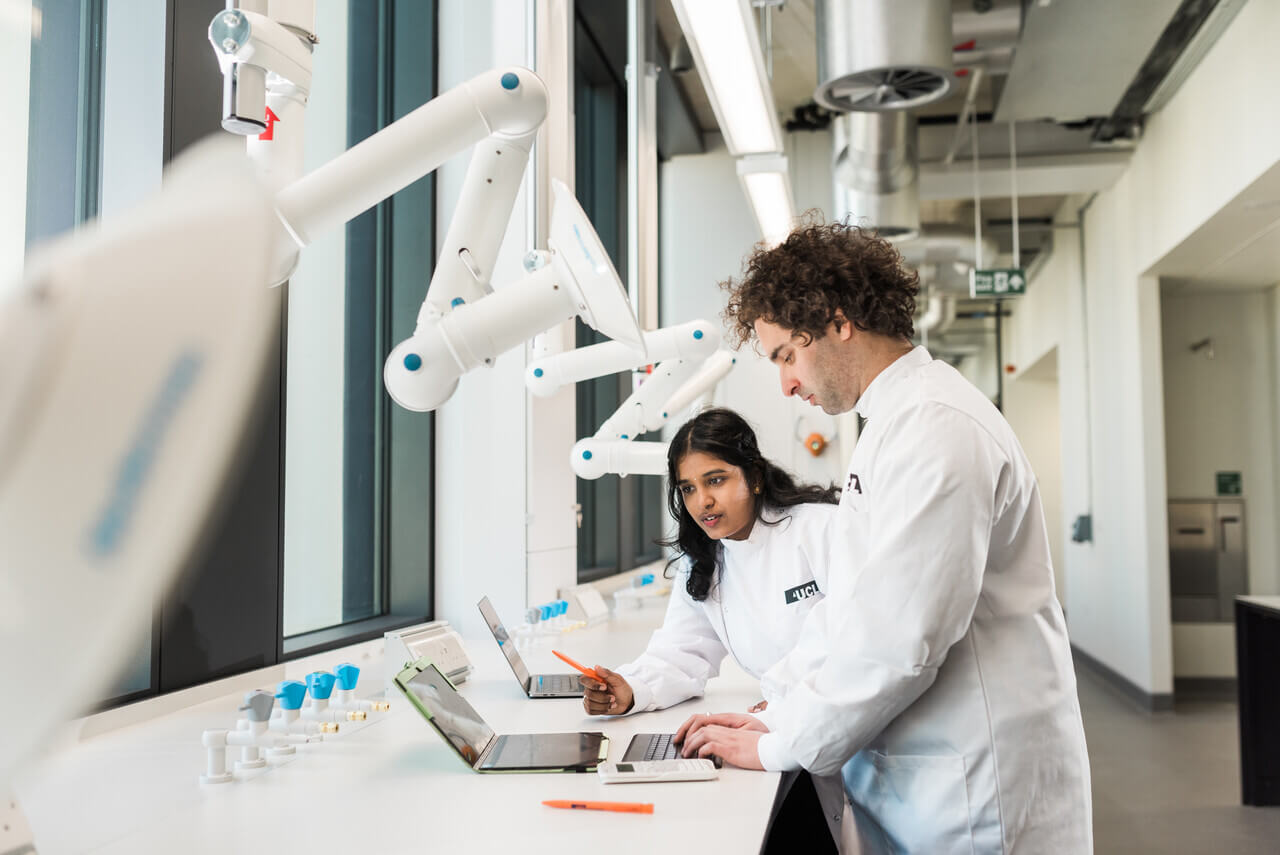
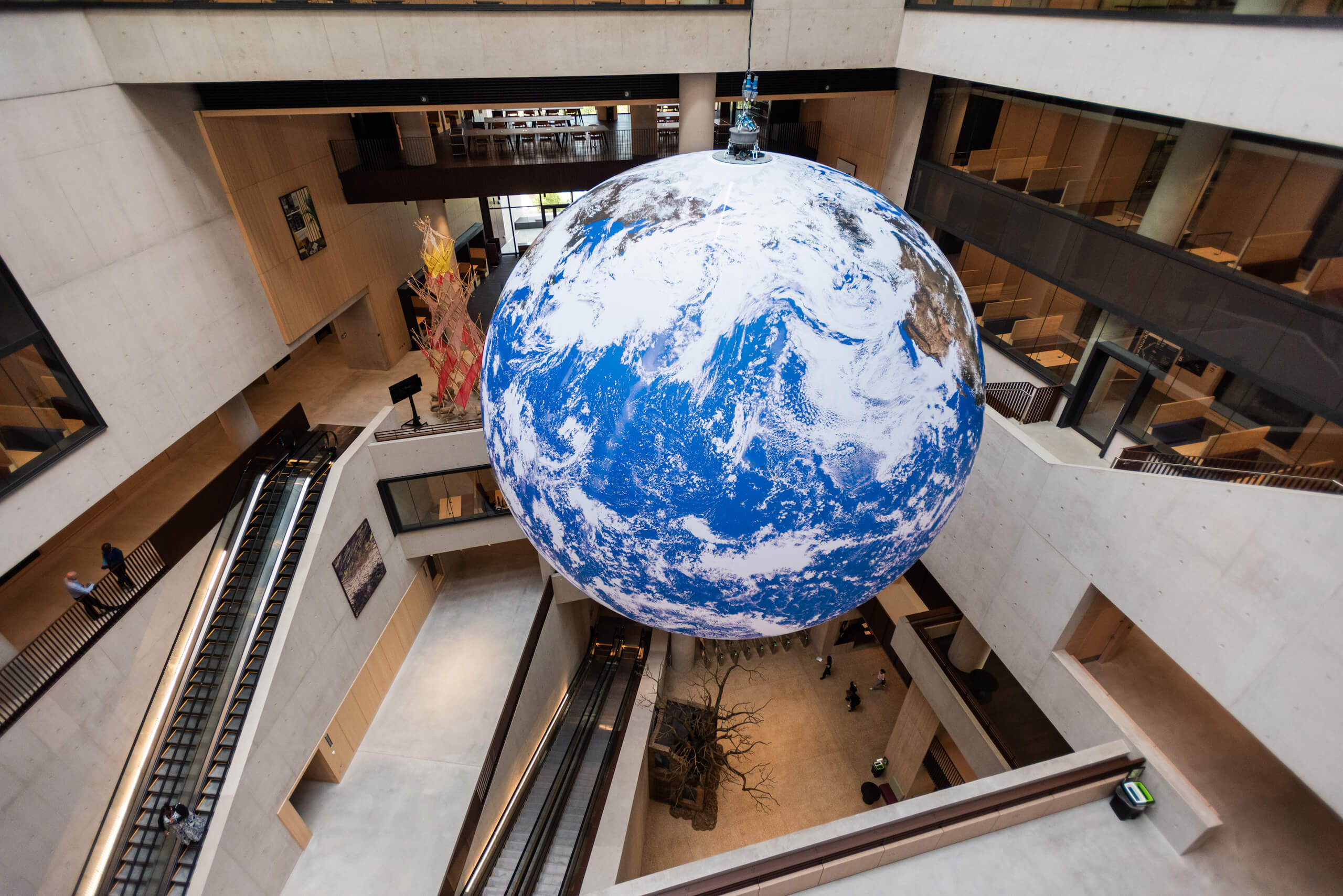
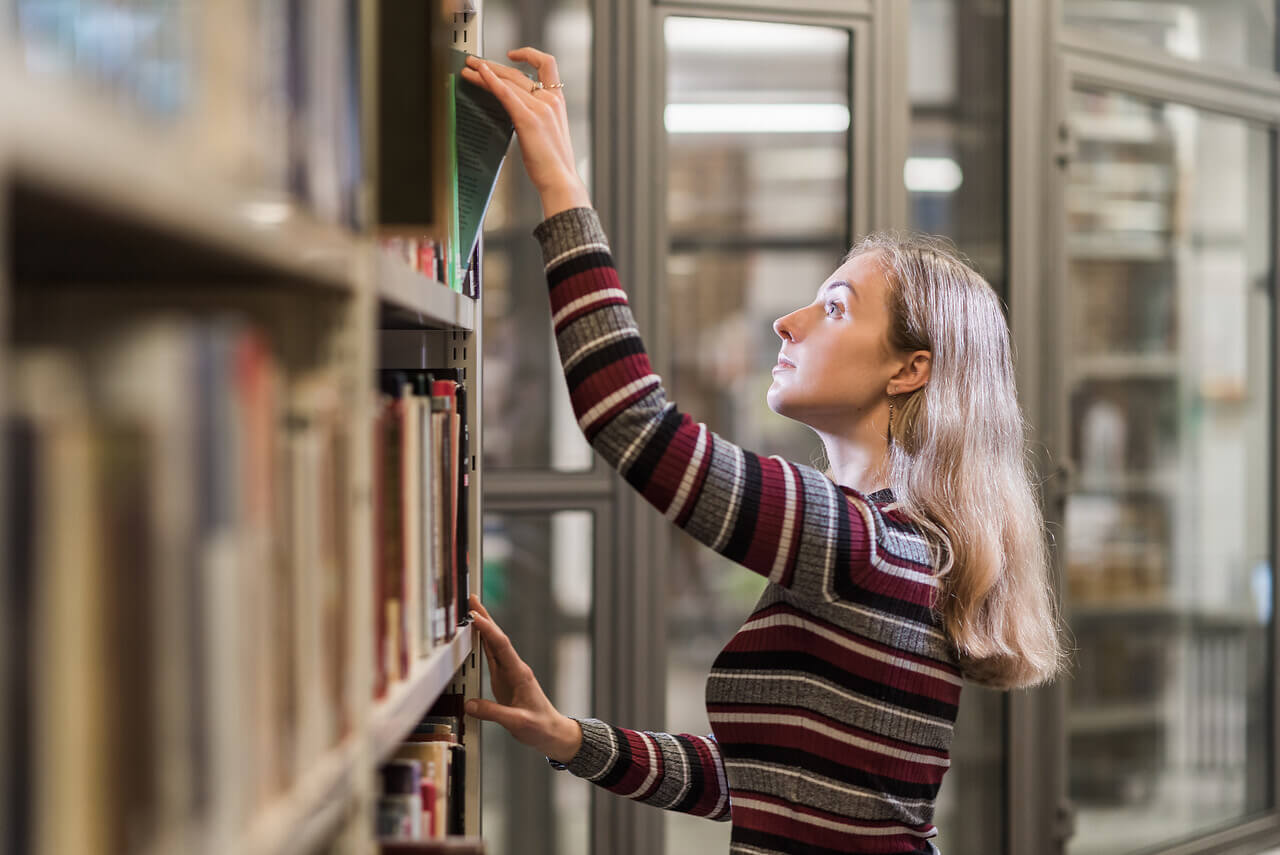
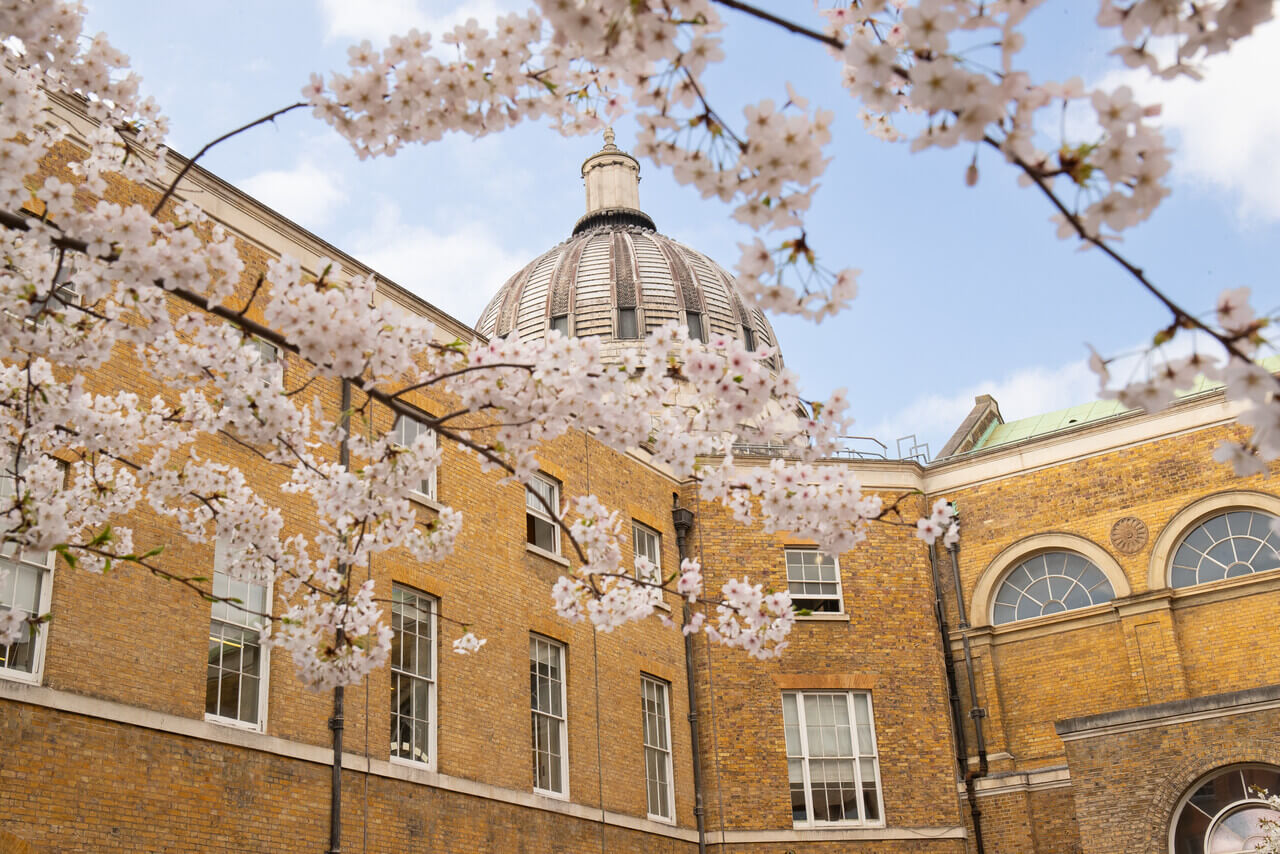
Philanthropy Impact Report
2025

Case studies
Welcome to the Philanthropy Impact Report
On the eve of UCL’s bicentenary, the power of our partnerships to forge a fairer, healthier and more sustainable world has never been so vital to the societies we serve.
It is remarkable what can be achieved in 12 months by people united in their purpose, and UCL is privileged to be the academic home to nearly half a million talented alumni from 190 countries, as well as the focal point of a far-sighted collective of friends, donors and partners who represent every walk of life.
Together, the last year has seen us harness novel technologies to transform neuroscience, take the fight to damaging online misinformation, and proactively support our scholars – present and future – in unleashing their potential for the long-term benefit of themselves and their own areas of expertise.
The report that follows is a small window on our vibrant philanthropic landscape at UCL, shaped over generations by thousands of supporters and their impact stories. Whether you give as an individual, charitable organisation or corporate partner – you share in a vision of what the future can be. And at UCL, we all have the unique shared space to build it.
That has been the function of our institution for 199 years, and in 2026 you will hear far more from us on the significance of our bicentenary. Having been founded on philanthropy and built under Benthamites, this is a university that has sought to fulfil a social mission from the day it opened its doors.
Now, we can look back with huge pride on nearly two centuries of “firsts”, discoveries, and a running total of 33 Nobel Prizes. But this is a university inspired by its past, not in thrall to it.
Why? Because philanthropy – and our work at UCL – is intrinsically about the future. It is the manifestation of a refusal to accept the status quo and the belief that when we take action to confront established wisdom, we can and often do find a better way.
In a world that faces great challenges, it is that ethos that we will celebrate on 11 February when we mark our bicentenary. And we will continue to celebrate you – those who see what we do here and want to be a part of it, giving us the platform to go further and faster in our responsibilities to people and planet.
Whichever of our areas of work has your support, and however you give: thank you.
Unlocking neurodegenerative secrets with AI
A significant donation from the Reta Lila Weston Trust for Medical Research will foster the use of artificial intelligence (AI) to help prevent, diagnose and treat neurodegenerative diseases.
Building upon more than half a century of partnership between the Trust and UCL, the award establishes a world-leading AI-centred brain tissue resource known as the Reta Lila Weston programme for Biomarker Research And Innovation in Neurodegeneration (Reta Lila Weston BRAIN).
This platform will utilise AI techniques to analyse clinical, genetic, pathological and multi-omic information from 2,500 human brain and spinal cord tissue samples donated to the Queen Square Brain Bank for Neurological Disorders (QSBB).
Supported by the input of colleagues across UCL, its task is to identify key molecules and pathways which predict disease onset, severity and progression; isolate biomarkers that will empower clinical trials; and highlight new disease mechanisms for the development of treatments.
A central component of Reta Lila Weston BRAIN is open access: researchers in all parts of the world will be able to analyse the UCL dataset as well as input their own data and observe how it alters their predictions. The platform will have the ability to learn from these external inputs and further refine its predictive power.
The insights generated have the potential to catalyse step-changes in diagnosis, prevention and treatment of neurological conditions which – taken together – comprise the leading cause of death and disability globally.
“AI will revolutionise the way we study neurodegenerative conditions,” said Professor Tom Warner, Chair of Clinical Neurology and Director of the Reta Lila Weston Institute at UCL.
“With one of the world’s largest brain tissue collection and world-leading clinical and neuroscience experts, UCL is in a genuinely unparalleled position to harness this transformative technology.”
Further to funding the Reta Lila Weston BRAIN platform, the new gift also provides a continuation in support for the Reta Lila Weston Institute of Neurological Studies at UCL, which was created in 1968 via a bequest from the Trust.
Bringing hope to people with Parkinson’s
A £1.7 million gift from the Edmond J. Safra Foundation is giving hope to people with Parkinson’s disease – one of the world’s fastest-growing neurological conditions.
The donation will support ongoing developments in the world’s largest-ever Parkinson’s trial, responding to an urgent need for treatments that can slow or stop progression of the disease.
Clinical research studies are vital to develop new treatments. To improve the availability, efficiency and innovation of clinical trials, a philanthropic grant of £1.375 million to UCL from the Edmond J. Safra Foundation in 2021 supported the establishment of a pioneering multi-arm, multi-stage (MAMS) clinical platform trial. The support of the Edmond J. Safra Foundation helped leverage the £26 million of largely philanthropic funding to support the trial’s delivery, as well as a range of novel sub-studies embedded within the trial.
Philanthropy has helped to leverage £26 million in funding for the trial.
The Edmond J. Safra Accelerating Clinical Trials in Parkinson’s Disease (EJS ACT-PD) study aims to find a treatment that slows the progression of Parkinson’s disease, rather than only providing symptom relief, prioritising drugs that already show promise as potential treatments. Designed to efficiently assess potential protective therapies, the Edmond J. Safra PD MAMS Platform Trial allows for multiple drugs to be tested simultaneously. Its flexible design will test a minimum of three drugs, aiming to introduce additional compounds into the existing trial infrastructure – saving time and money relative to traditional protocols.
Now, a further gift of £1.7 million from the Edmond J. Safra Foundation is supporting the ongoing work of the initiative, enabling new innovations and cutting-edge science to be embedded, and ensuring the trial continues to be world-leading. As such, its findings will bring effective treatments to patients as quickly as possible.
“Over the past four years, the Edmond J. Safra Foundation has been privileged to support the development of the Edmond J. Safra ACT-PD Initiative, culminating in this historic trial launch," said Max Coslov (Director, Edmond J. Safra Foundation). "The dedication of the researchers, patient participants, administrators, and partner funders involved in this initiative offers hope to countless patients and families worldwide.
"We commend their achievement and extend our best wishes for the continued success of this ground-breaking endeavour.”
Feature: Accelerating prostate cancer diagnosis
The support of The John Black Charitable Foundation is providing the basis for clinicians to diagnose prostate cancer faster, positively impacting millions of men across the world.

Responding to online misinformation
A donation from Pears Foundation is enabling teachers to respond to online conspiracy theories and misinformation that are having a serious and damaging impact on young people.
Misinformation and conspiracy theories are now easily accessible to children via social media. From the well-publicised misogyny spread by the likes of influencer Andrew Tate, to misinformation about global events or even health and wellbeing, teachers lack the training and resources to respond when conspiracy theories are brought into the classroom.
In 2024, Pears Foundation, a longstanding funder of UCL and the UCL Institute of Education (IOE), established a Commission on Countering Online Conspiracy in Schools, which published its report and recommendations earlier this year. The Commission identified an urgent need for teacher training in this area.
To take the recommendations forward, Pears Foundation engaged the IOE to design and deliver continuing professional development (CPD) for teachers on this topic, led by IOE lecturer and former schoolteacher Jeremy Hayward, who gave evidence to the Commission and now sits on its Advisory Board.
An initial year-long project commenced in May 2025. Piloting CPD delivery for teachers in 19 Star Academies schools across the country, the sessions are focusing on equipping teachers with strategies to respond to students who raise issues around conspiracy theories.
Through discussions and case studies, participants learn to identify when to correct misinformation, when to stop a discussion and initiate a one-to-one chat, and when misinformation may be codified hate speech.
“The way young people gain information about the world has completely changed,” said Jeremy. “As a society, we’ve allowed unregulated people to whisper anything into the ears of young people. This has to change.
“It can be difficult for governments to respond at state-level – their agendas are already full and complex. Pears Foundation has recognised this problem and is doing amazing work here. The Foundation has enabled us to start a really important project that can make an immediate impact, that will hopefully have far-reaching implications for how young people interpret the world.”
Following the successful pilot, the Foundation and the IOE are working to roll out this CPD resource to more schools nationwide.
Facilitating digital transformation to tackle societal challenges
A blended investment from Amazon Web Services (AWS) is powering up the research capabilities of talented PhD students who are working to achieve positive global impact.
Having supported the establishment of the UCL Centre for Digital Innovation (CDI) in 2022, AWS is now making an additional contribution to create high-impact scholarships for PhD students whose research aligns with its mission to develop innovative digital solutions to complex challenges in higher education and healthcare.
The awards provide PhD candidates at UCL with ‘AWS credits’ to support experiments and testing, as well as exclusive access to mentorship from the technical professionals who design, implement, and maintain cloud-based solutions using AWS software.
With access to these sector-leading technologies, PhD students unlock the potential to accelerate and scale their research. This enables faster routes towards solutions for global challenges and establishes a new pathway towards scientific innovation and entrepreneurship.
PhD student Chu'nan Liu was a recipient of both the AWS Doctoral Scholarship and the CDI Digital Innovation credits, which enabled him to pursue research into antibody development. Embarking on training and workshops also served to strengthen his technical expertise in cloud computing, AI workflows and DevOps practices.
Chu'nan went on to co-found a start-up, abYcloud, which joined the CDI’s in-house Impact Accelerator programme. Together, he and his colleagues have utilised AWS technologies to transform a prototype into a Software as a Service (SaaS) platform, and abYcloud recently became a service provider for a UK biotechnology company.
“The research of our PhD students holds tremendous potential for societal impact,” said Graca Carvalho, Director of UCL CDI. “Giving them access to AWS is a way they can work towards long-term goals, while sparking entrepreneurial energy and embedding key technologies into their practice.”
The UCL CDI is a joint initiative between UCL Innovation & Enterprise, the UCL Centre for Advanced Research Computing, and AWS UK Public Sector, focused on aiding the development of technologies that demonstrate real-world benefit and impact.
Feature and film: Making space to pursue big ideas
Long-term philanthropic funding has enabled UCL’s Gatsby Computational Neuroscience Unit to pursue ideas and make discoveries that are shaping our world.

Empowering the next generation of chemical engineers
UCL alumnus Fraser Allen is enabling PhD students in the UCL’s Department of Chemical Engineering to drive forward their research with funded studentships.
Having graduated from UCL with a BEng Chemical Engineering degree in 2001, Fraser has gone on to have a varied and successful career in the field. Keen to recognise his own formative experience at UCL and widen access to quality education, he first re-engaged with his former department as a donor in 2018.
Fraser went on the fund the UCL Chemical Engineering PhD Excellence Scholarship, which enabled doctoral student Philipp Deussen to pursue his research in geological models with the aim of improving methods in geological exploration.
“I am truly enthusiastic about this research project,” said Phillipp. “I would like to express my gratitude to [Fraser] for making it possible.”
Wishing to support more promising chemical engineers at UCL, Fraser has this year broadened his support to encompass a number of PhD studentships. Helping to advance a range of priority initiatives in chemical engineering, these vital awards cover funding, research support, and academic enrichment activities for the selected PhD candidates.
“When alumni want to make gifts to us, it highlights the top-quality and memorable education students receive at UCL Chemical Engineering,” said Professor Eva Sorensen, Head of the Department of Chemical Engineering. “Our students are the next generation of innovators and problem-solvers who can make a tangible difference to the world around us.
“I’m incredibly grateful to Fraser and all likeminded donors for giving them the opportunity to shine – enabling talented young engineers to develop their ideas and research through these life-changing studentships.”
Elevating UK-Japan opportunities
A gift from the Japanese biotechnology company Amano Enzyme is giving Japanese students from under-represented backgrounds the opportunity of a UCL postgraduate education.
Building on more than 160 years of rich relations between UCL and Japan, Amano Enzyme’s donation will enable UCL to provide scholarships over the next five years. It will fund the newly launched UCL Musubi Global Master’s Scholarship, which will give Japanese students the opportunity to study a one-year Master’s programme at UCL from 2026-27 onwards.
Part of the Musubi Initiative between the UK and Japan, the award will offer vital opportunities to applicants facing challenging financial circumstances. By providing support for living costs and/or tuition fees for the duration of a postgraduate degree programme, the UCL Musubi Global Master’s Scholarship takes steps to address historic barriers to a world-class education.
Julia Longbottom CMG, UK Ambassador to Japan, said: “Investing in educational opportunities for the next generation will help us to inspire and foster the next generation of leaders in each of our countries.
“The UK-Japan partnership is flourishing, and giving young people from all backgrounds a chance to be a part of this is vital. The UCL Musubi Global Master’s Scholarship is a key step, and I thank Amano Enzyme for investing in the futures of talented Japanese students who wish to study in the UK.”
This scholarship forms part of UCL's Global Scholarships programme, launched in 2022 to support international students from lower income backgrounds. The goal is to promote and widen access to study at UCL, so that personal circumstances have no impact on the ability of hard-working students to learn.
Launched in 2024, the Musubi Initiative is a UK-Japan programme aimed at promoting connections between the UK and Japan, creating opportunities, innovation and economic growth.
Inspiring a free-thinking future for sustainable construction
A gift from the Holcim Foundation for Sustainable Construction has empowered a group of visiting Fellows to elevate their approach to sustainable construction, helping to address the climate crisis.
The award has established the Holcim Foundation Fellowship for Europe in London, hosted at UCL Civil, Environmental, and Geomatic Engineering (CEGE), supported by industry partners AL_A, BDP, Buro Happold, Eckersley O’Callaghan and Expedition Engineering.
With the buildings and construction sector responsible for 37% of global emissions (UN Environment Programme), industry stakeholders are taking decisive action to contribute to a worldwide reduction in greenhouse gas emissions and reach net zero targets.
The Holcim Foundation Fellowship was created with this in mind. Interrogating the theme of ‘innovating tomorrow’s resilience’, 16 Fellows – a group of multidisciplinary Master’s students and early-career professionals from across Europe – participated in an intensive two-week course at UCL in July 2025.
Working with instructors and industry practitioners, they observed, analysed, questioned, proposed and designed interdisciplinary strategies for transforming the mechanisms that influence the social, environmental and economic conditions of European cities. Aiming to bridge the gap between academia, professionals and society, the Fellowship focused on empowering the students to become catalysts for industry transformation.
Throughout the programme, the Fellows tested the limits of the Mayor of London’s spatial development policy – The London Plan, and created a London manifesto, titled What If? – which was presented directly to the Greater London Authority. Their core finding was that technical competence is necessary but insufficient; embedding sustainability and resilience requires activating the key levers of city planning that aims at equity, inclusivity and economic viability.
“The value of the Fellows’ manifesto was in shifting how we see the city: as something shaped by policy, yes – but also by intention, omission, and the cumulative effect of everyday decisions,” said Saba Carmel Meidany from the Holcim Foundation. “I congratulate the Fellows on producing a sharp, grounded and ambitious Manifesto for London!”
Matthew Heywood, Associate Professor at UCL, said: “From architecture and planning to sustainability, policy, engineering, and community engagement, they moved effortlessly across boundaries, drawing links and insights that enriched every discussion. If these Fellows represent the next generation of leaders, then the future of our profession, our cities, and the wider built environment is in capable hands.”
All Fellows take their knowledge and innovative ideas with them into their future careers, with three from this Fellowship selected to continue their journey on the Holcim Foundation Emerging ChangeMakers programme, which aims to strengthen a purpose-driven global network.
Advancing research on slavery, reparations and media
A new philanthropic gift has created two fully funded four-year PhD studentships at UCL’s Centre for the Study of the Legacies of British Slavery (CSLBS), strengthening research on slavery, its legacies, and contemporary debates on reparations.
Beginning in 2025/26, the award supports one scholar of Caribbean origin and another UK-based student of Caribbean heritage. Together, they will bring vital regional perspectives and intellectual insight to this expanding field as well as contributing to the diversity of experiences and expertise in our postgraduate community.
Delivered through a cross-disciplinary collaboration between the UCL School of European Languages, Culture and Society (SELCS-CMII) and the CSLBS, the two new studentships will bring together vital knowledge in film, media and cultural studies to bear on historical and archival research.
Dr Clive Chijioke Nwonka, Associate Professor of Film, Culture and Society, whose work explores race, media and Black British cultural politics in partnership with Professor Matthew J. Smith, Director of the CSLBS, developed the studentships to ensure they reflected the Centre’s focus on the legacies of slavery.
“Our ambition was always to try and establish an opportunity for PhD students of Caribbean heritage working across multiple disciplines, approaches and methodologies,” said Dr Nwonka. “This gift makes it possible to recruit students to do the critical work needed to understand contemporary British society’s relationship with slavery and its repercussions, and the work needed to create a just and equitable future.”
“These studentships come at a vital moment,” Professor Smith added. “Research into the lived experiences of enslaved people and the structures of chattel slavery is central to our mission. The new scholars will make important contributions to this work.”
Both departments have now recruited scholars to the roles. Professor Smith and Dr Nwonka expect both projects to uncover overlooked histories, deepen understanding of Black identity and anti-Black racism, and lay the foundations for future research in Black Humanities at UCL.
Leaving a legacy of art and ideas
For more than half a century, collecting has been a profound and defining thread in John Janssen’s life. Now, he is working with UCL to ensure it is preserved for the next generation.
What began in 1963 when he arrived in England as a young research student and discovered the world of Victorian illustrated books has since soon grown into a lifelong passion for the artistry of small press publications, contemporary book-making and visual poetry.
Over the decades, John has assembled an extraordinary body of material: more than 6,000 artist books; small press pamphlets; rare conceptual and visual poetry books; Victorian illustrated books of the ‘Golden Sixties’; and approximately 250 multi-format artworks by artists associated with Coracle Press and Gallery (1975 - present). Together, these items form a rich, interconnected record of independent, non-commercial publishing from the 19th century to today.
This year, John made the decision to bequeath his lifetime collection to UCL and pledged an additional percentage of his estate to ensure the preservation of these important works. He knew he wanted the art and the books from his collection to remain together.
After exploring different options, he found that UCL was the only institution willing to and capable of caring for the full breadth of the material:
“UCL guaranteed that my collection would not be dispersed, and that it would be preserved and be displayed for the benefit of future generations,” said John. “UCL already holds one of the largest and most significant collections of independent, experimental literary, visual and counter-cultural publications. So, it is a perfect marriage.”
John’s collection, to be titled 'The Coracle and Friends Collection', represents “an extremely significant addition to one of UCL’s flagship collecting areas: filling crucial gaps in our holdings, strengthening our profile for research in this specialist area and enhancing our reputation as a global research hub for 20th century literature,” according to Elizabeth Lawes (UCL Special Collections).
“I truly believe that this gift will bolster our opportunities to attract research funding, enhance the student learning experience and inspire future writers, artists and scholars,” she added. “We are therefore delighted to be able to look after John’s collection and ensure it is not only preserved but also actively utilised in teaching, both within UCL and beyond, for many years to come.”
Connecting our alumni: Tammy Sandhu MBE
Having graduated from UCL in 2005 with a Master’s degree in International Public Policy, Tammy Sandhu most recently served as His Majesty’s Consul General in San Francisco. She also gives her time supporting fellow UCL alumni and strengthening opportunities for UCL engagement.
Keen to embark on an international career, Tammy Sandhu MBE gained a postgraduate degree at UCL to pursue her ambition of working for the Foreign and Commonwealth Office (FCO) – now the Foreign, Commonwealth and Development Office (FCDO). She went on to take up various postings, being elected Chair of the FCO’s BAME Committee, and receiving an MBE for her service to Diversity and Inclusion in 2021.
Tammy’s most recent role as His Majesty’s Consul General in San Francisco – which she held from 2023 until summer 2025 – saw her equality, diversity and inclusion work continue, and gave her an invaluable platform to support the local UCL community.
In this period, she hosted and opened two alumni receptions at the British Consulate General in San Francisco – one of which was the best attended alumni event in California since the Covid-19 pandemic.
At both alumni events there were panel discussions with leading UCL academics about some of the key issues of our times: first on the future of the health and biotech industries with an FCDO regional director, and a subsequent event exploring the evolving intersection of law, technology, and media regulation with a judge from the Superior Court of California.
Tammy has also opened doors to further UCL engagement and opportunities in the Bay Area, forging valuable connections between UCL Innovation & Enterprise, UCLB (the commercialisation company of UCL), and entrepreneurial networks in San Francisco.
“Being part of something bigger than yourself brings connection, progress and innovation,” Tammy said. “These are all things I care about, and volunteering for UCL is part of this. By bringing people together and enjoying our shared UCL connection, we’re strengthening both our networks and friendships. And as I’ve seen first-hand throughout my career, that’s always a good thing.”
Nurturing the UCL community: micro-volunteering
The new Alumni-Student Chats programme is connecting our alumni and students, bringing a deeper sense of connection within the wider UCL family.
Many alumni stay connected to UCL by giving their time, and students relish the opportunity to interact with alumni, gaining inspiration from their journeys and insights into their career paths.
Bringing these two elements together led to the January 2025 pilot of Alumni-Student Chats, part of UCL Student Support and Wellbeing Service’s ‘Beat the January Blues’ campaign.
After alumni and students put themselves forward to participate in the programme, 80 matches were made, based on similarities in academic journeys or countries of origin. Each match resulted in a 30-minute online or in-person conversation, with participants discussing everything from career tips to getting the most out of student life.
“Sometimes the best advice we get in life is given in a one-off conversation,” said Tim Winward-Hart (UCL Advancement). “This offers scalable and accessible volunteering opportunities for alumni, while enriching the student experience. It deepens the sense of belonging at UCL for everyone involved.”
Drawing on the success of the Alumni-Student Chats pilot, the programme will now run twice per year, with capacity increasing so even more matches can be made. Community-building is at the heart of this initiative, with both alumni and students enthusiastic about fostering deeper links across UCL generations.
“As it happened, my career trajectory matched well with the student's current thinking – to become a physics teacher,” said one alum participant. “I wish I had had the opportunity to talk with someone who had already taken the path I was contemplating, when I was an undergraduate. It’s a great scheme!”
Thank you
It is an honour to have the final word in this Philanthropy Impact Report, because our partnership with UCL includes some of Pears Foundation’s most inspiring and impactful work.
The more I thought on this, the more it made sense: for many years, the work the Pears Foundation shares with UCL has been a partnership in the truest sense of the word.
For almost two decades, we have been deeply proud to support major UCL-led initiatives. From establishing the Centre for Holocaust Education, to supporting the Centre for Research in Autism and Education and the Impartial Chairs programme at the Students’ Union, our work spans multiple departments and disciplines. It is a partnership in the truest sense. It is a privilege to learn from, and think with, some of the UK’s finest minds.
This past year we were delighted to expand our partnership to include the UCL Policy Lab’s work to advance understanding of social cohesion, and a collaboration with the UCL Institute of Education to address the urgent challenge of online conspiracies and misinformation in schools.
Whatever issues we are exploring at Pears Foundation, we know there is likely to be someone at UCL who can offer insight, evidence and thoughtful challenge — and who shares our commitment to making a difference.
One of the most inspiring moments of my two decades at Pears was a morning, a few years ago, when we gathered together all the people at UCL whose work the Foundation supports. I looked around the room and saw teacher trainers, historians, education specialists, clinical researchers and neuroscientists at every stage of their careers.
What united them was their curiosity, their integrity, their ability to communicate cutting-edge work with passion and humility, and their desire to bridge research and practice. We all share the same desire to make a difference in the real world, and the impact of our work with UCL can be felt in classrooms, hospitals, families and communities across the country.
I would also like to recognise the valuable role played by the UCL Advancement team, who steward these partnerships with great care and in a way that truly reflects UCL’s values.
I hope you have found this report as inspiring as I have, and that it strengthens our collective belief in what is possible when people with shared values come together to create positive change.
To all the donors, volunteers and partners who make this work possible: thank you. And as UCL approaches its 200th anniversary, I look forward to many more stories of impact still ahead of us.

